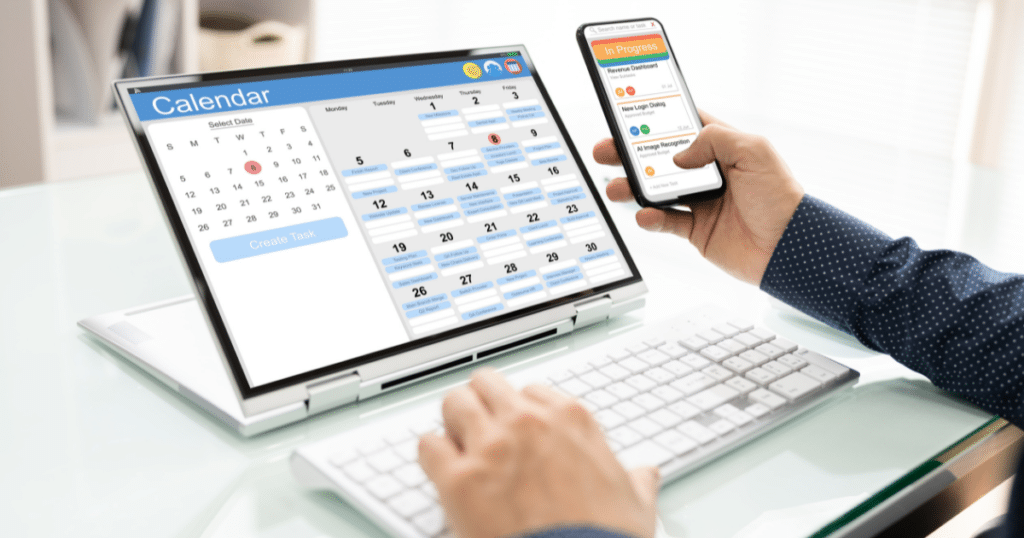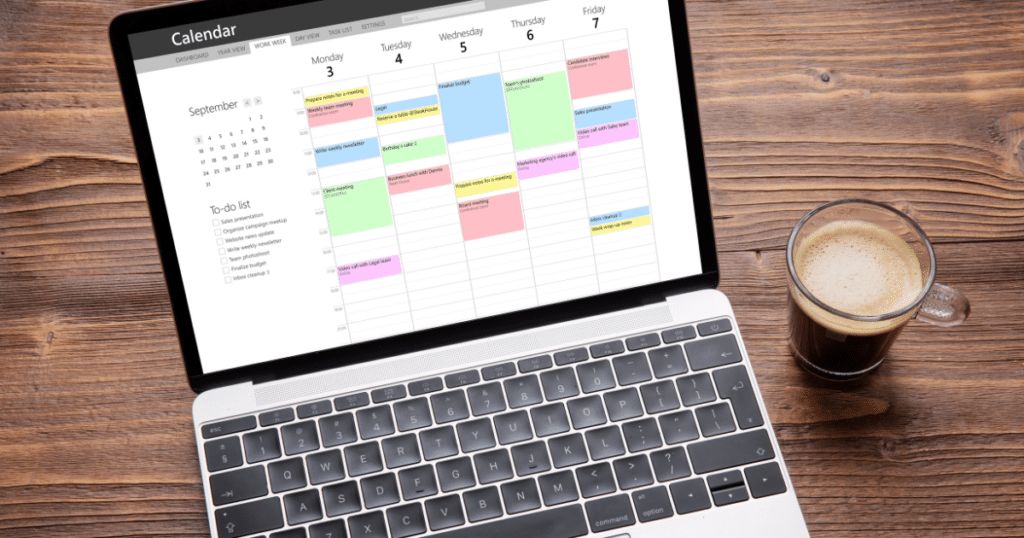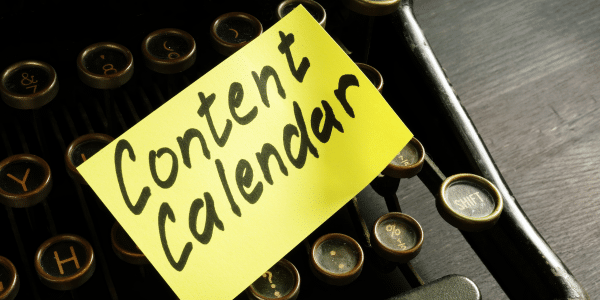Boost Your Business Growth with a Blog Content Calendar
When it comes to blog content, people tend to be on two sides. One side randomly chooses blog post ideas and runs with them on a whim, while the other side creates a blog calendar. Those who plan content out in advance tend to produce successful content that ranks and does well, and the others will post content and wonder why they see very little traffic. You need a blog content calendar if you want to create content.
A content calendar will help get all your ducks in a row and ensure your content performs. Not all online content will do well, and often, it’s the content published without a strategy that fails. Planning content in advance can set you up for success. A blog content calendar is key whether you’re doing content on your own or you hire a content creation company to do everything for you.

In this article, we will talk about how to build a content calendar so that you can publish the best content in your industry and build the trust, respect, and authority your business needs.
Table of contents
What Is a Blog Content Calendar?
A blog content calendar is a tool businesses and individuals use to plan and organize their content creation and distribution efforts. It is a visual representation of the content that will be created and shared over a specific period of time. Blog content calendars typically include details such as the date and time of publication, the type of blog content, the topic or theme, and any associated keywords or hashtags. A blog content calendar aims to streamline your content production, ensure consistency, and help maintain an organized approach to content marketing.
Related Article: Schedule Everything In Your Life and Business
A content calendar for your blog will help you visualize content ideas and framework around your business, seasonality, and any launches or big news you need to get out to your customers. When you create a content calendar, you can create content that will add value and have it be quality content rather than something quickly tossed together and published on your website.
Why Do You Need a Calendar for Your Blog?
Unfortunately, not many people or businesses think about the type of content they need for their blog. Many will just randomly think of a topic and run with it. A calendar will help you strategically lay out the framework of your blog and ensure you have content that will help drive traffic and sales.
Here are several reasons why you need a blog content calendar:
1. Organization
A content calendar helps you stay organized and keeps your blog content strategy on track. It allows you to plan and schedule your blog posts in advance, ensuring a consistent and well-structured publishing schedule.
2. Consistency
Consistency is key in blogging. A content calendar helps you maintain a consistent posting frequency, whether it be daily, weekly, or monthly. By having a schedule and plan in place, you can avoid periods of inactivity on your blog and keep your readers engaged.
3. Planning and Preparation
A content calendar allows you to plan and prepare your blog content in advance. You can brainstorm ideas, research topics, and gather resources ahead of time, making the writing process smoother and more efficient for each piece of content.
4. Collaboration
A content calendar facilitates collaboration and enables everyone to work together seamlessly if you have a team of writers or contributors. It provides a centralized platform to share ideas, assign tasks, and keep track of progress.
5. SEO and Keywords
A content calendar helps you manage your SEO strategy effectively. By planning ahead, you can research relevant keywords for each blog post, optimize your content, and improve your chances of ranking higher in search engine results.
6. Audience Engagement
A well-planned content calendar enables you to consider your audience’s needs and preferences. You can strategize content around specific themes or events, ensuring you deliver valuable and timely information to your readers.
7. Time Management
A content calendar helps you save time by streamlining your content creation process. With a clear plan in place, you can allocate time for writing, editing, and promoting your blog posts, making the most of your available resources.

Overall, a content calendar is an essential tool for effective blog management. It helps you stay organized, maintain consistency, plan ahead, collaborate, optimize for search engines, engage your audience, and manage your time efficiently.
How To Create a Content Calendar
Creating a blog content calendar is a useful tool for organizing and planning your blog posts. It helps ensure a consistent posting schedule and allows you to plan your content ahead of time. Here’s how you can create a blog content calendar:
1. Choose a format
Decide on the format you want to use for your blog content calendar. It can be a spreadsheet, a calendar application, or even a physical calendar. Choose whatever format works best for you and your team.
2. Choose a timeframe
Determine the timeframe you want to plan for. It could be a month, a quarter, or even a whole year. Consider your blogging frequency and how far ahead you’d like to plan your content.
3. Determine your goals
Identify the goals you want to achieve with your blog. Do you want to increase traffic, generate leads, or establish yourself as an industry expert? Understanding your goals will help you plan your content accordingly.
4. Brainstorm topics
Start by brainstorming a list of potential blog post topics. Consider your audience’s interests, current industry trends, and keywords you want to target. Aim for a mix of informational, educational, and entertaining content.
5. Assign deadlines
Assign deadlines for each blog post to ensure accountability and a consistent posting schedule. Take into account factors like research time, writing, editing, and publishing.
6. Create a content plan
Once you have your topics and deadlines, start plotting them on your calendar. Make sure to diversify the content types and topics to keep your blog interesting and engage your audience.
7. Plan promotions and distribution
Think about how you will promote each blog post. Will you share it on social media, send it out in a newsletter, or collaborate with other bloggers for guest posts? Include these promotional efforts in your content calendar.
8. Monitor and adjust
Continuously monitor the performance of your blog posts. Use analytics tools to track metrics like views, engagement, and conversion rates. Based on the data, adjust your content plan to optimize your results.
9. Collaborate and communicate
If you’re working with a team, ensure everyone has access to the content calendar. This allows for transparency and collaboration. Use tools like Google Sheets or project management software to facilitate communication and coordination.
10. Review and refine
Regularly review your content calendar to assess its effectiveness. You may need to make adjustments based on new developments, market trends, or audience feedback. A content calendar should be a flexible tool that helps you adapt and improve your blogging strategy.

Remember, a blog content calendar guides and organizes your content schedule. Be flexible and willing to adapt as needed while staying true to your overall goals and objectives.
What Should a Blog Content Calendar Include?
Create your content calendar with the following information:
1. Publication dates: Include the dates on which each blog post will be published. This will help you keep track of your posting schedule and ensure consistency.
2. Blog post topics: List the topics or themes for each blog post. This will help you plan your content in advance and ensure you cover a range of relevant topics.
3. Keywords: Identify the keywords or phrases you want to target with each blog post. This will help with search engine optimization (SEO) and make it easier for readers to find your content.
4. Author: Assign each blog post to a specific author or contributor. This will help you manage your team and ensure each post has a consistent voice.
5. Status: Track the progress of each blog post, such as whether it’s in progress, completed, or scheduled for editing. This will help you stay organized and ensure each post goes through the necessary stages before publication.
6. Promotion plan: Note down how you plan to promote each blog post, whether it’s through email newsletters, social media posts, or other channels. This will help you amplify your reach and drive traffic to your blog.
7. Target audience: Identify the specific audience or personas you are targeting with each blog post and create a blog content strategy. This will help you create relevant, engaging content that resonates with your readers.
8. Performance metrics: Track the performance of each blog post, such as page views, engagement metrics, and conversions. This will help you understand what your audience considers great content and refine your future content strategy.

By including these details in your blog content calendar, you can effectively plan and manage your blog content to serve your audience better and achieve your blogging goals.
Maximize Content Creation and Marketing Success with a Content Calendar for Your Blog
Something you should invest in for your business is a content writing service. You can either hire someone in-house or outsource it through a freelancer. I’ve found that businesses tend to lean toward freelancers to save money and not increase their overhead by adding someone else onto their payroll.
Related Article: 10 Reasons Your Brand Needs an SEO Content Writer
These freelancers and content marketers can help build content your audience is looking for and will engage with. Manage your content by building a content calendar and keeping everything organized. When trying to build your traffic and sales conversions, a content calendar is a resource you can’t do without. Use your content calendar to get ahead so that you’re never rushed publishing your evergreen content.
If building out a blog content calendar is something you’re interested in, we would love to help you create content that resonates with your audience and helps build your traffic and sales. Whether in the health, fitness, and supplement industry where Weik Fitness can be of service or any other industry where our other writing service company, Writing Rebels, can help, we’d love an opportunity to show you exactly how with the right content strategy, you can see amazing results and success with your business.
Feel free to contact us today to start building out your blog content calendar!


*Disclosure: This article may contain affiliate links or ads, which means we earn a small commission at no extra cost to you if you make a purchase through these links. These commissions help support the operation and maintenance of our website, allowing us to continue producing free valuable content. Your support is genuinely appreciated, whether you choose to use our links or not. Thank you for being a part of our community and enjoying our content.
PLEASE CONSIDER SHARING THIS ON YOUR SOCIAL MEDIA TO HELP OTHERS LEARN MORE ABOUT THIS TOPIC. SIMPLY CLICK BELOW!

